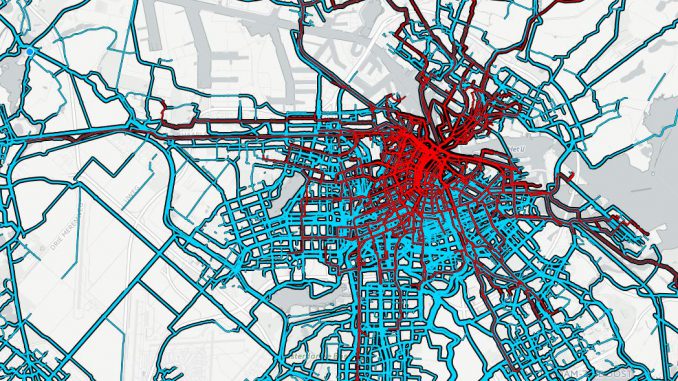
DCA Blog by Joost de Kruijf. Researcher Urban Intelligence at NHTV Breda University of Applied Sciences. PhD candidate in E-cycling experience and behavioural change at Utrecht University.
Co-founder of Cycleprint and Cyclespex
Perhaps a strange call for more cycling expert judgment from a Dutch guy, living in a country with sixteen million cycling experts. Their expertise is frequently based on their own life long experience and learning while doing. People do not talk much about cycling because it seems naturally as it’s a part of growing up in the Netherlands. We cannot speak of broad expertise in that sense. The Dutch are generally known to be blunt, direct, very informal and not much reserved in giving their opinion and judgement. Despite the excellent work on cycling in the past, cycling expert judgement needs revision.
Cycling data is hot and with the increase of (GPS) cycling data and the rapid development of smart algorithms we are able to pin-point the behaviour of large numbers of cyclists. State of the art visualizations do not only show where people cycle but also their route choices, cycling speeds and delays. Looking at the actual behaviour of large number cyclists will not only learn us more about their preferences, it also enables us to make the switch to customer friendly cycle policy. With the GPS-data availability, experts in the field of data-science are addressing multiple research questions on the relation between the actual cycling behaviour, cycling infrastructure and the built environment.
The idea that cyclists take the shortest route from origin to their destination is really out dated and proven wrong. Now the question arises which factors actually influence route choice and to what extent. We are increasingly exploring those but up till now but we can only assume it is influenced by e.g. the presence of traffic lights on parallel routes, the vividness of the built environment and presence of motorized heavy traffic, based on our own behaviour and previous experiences. Next to the generation of more GPS cycling data and development of even more sophisticated customer friendly web-application we should start asking cyclists more about their ‘odd’ behaviour based on the data. Cyclists are less restricted to the availability of infrastructure than people using public transport or car, so their behaviour is more in-line with their personal preferences and judgement.
There is another urgent need for expert judgement which lies within the definitions of cyclists behaviour. Although speed is relative according to Albert Einstein, this is one of the more easy criteria to determine. The question how we can calculate and visualize cyclists delay is already more difficult. For car traffic the definition of congestion is already fixed and related to a minimum speed limit. If we would regard all cycling below 10 km/h as a delay, we face some impracticalities. For commuter cyclists with an cruising speed of 22 km/h the experience of 10 km/h is completely different than a group of student cycling 12 km/h normally. Therefor relative cycling speed (actual speed relative to the desired cruising speed) is introduced. This is just an illustration that cycling behaviour, as an embodied experience, is a mode of transport with its own set of rules. It is not so much to evoke a theoretical discussion about cycling behaviour but it is necessary to link up with the development that cycle infrastructure investments need to be supported by figures. Social cost benefit analysis are calculated using the potential cyclists and reduction of delay brought about by these investments.
This raises the question whether cycling expert judgement becomes more a field of cooperation between different specialists instead of individual cycling professionals? We can neither ignore the power of the emerging technologies nor can we ignore the existing cycling knowledge. Without the desire for mutual understanding and cooperation cycling policy will not become more customer friendly on short notice.
